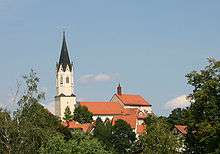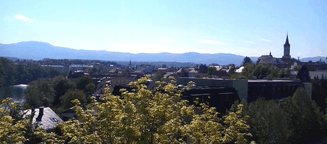Novo Mesto
| Novo Mesto Novo mesto | |
|---|---|
| Town | |
|
Novo Mesto with the Krka River from the air | |
| Nickname(s): City of Situlas | |
| Coordinates: 45°48′N 15°10′E / 45.800°N 15.167°ECoordinates: 45°48′N 15°10′E / 45.800°N 15.167°E | |
| Country |
|
| Traditional region | Lower Carniola |
| Statistical region | Southeast Slovenia |
| Municipality | Novo Mesto |
| Government | |
| • Mayor | Gregor Macedoni |
| Area | |
| • Total | 33.3 km2 (12.9 sq mi) |
| [1] | |
| Population (2011) | |
| • Total | 23,341 |
| • Density | 700/km2 (1,800/sq mi) |
| [1] | |
| Time zone | CET (UTC+01) |
| • Summer (DST) | CEST (UTC+02) |
| Website |
www |
| Source: Statistical Office of the Republic of Slovenia, census of 2002. | |
Novo Mesto (pronounced [ˈnɔːʋɔ ˈmeːstɔ]; Slovene: Novo mesto; also known by other alternative names) is the city on a bend of the Krka River in the City Municipality of Novo Mesto in southeastern Slovenia, close to the border with Croatia. The town is traditionally considered the economic and cultural centre of the historical Lower Carniola region.[2]

Name
Novo Mesto was attested in historical sources in 1365 as Růdolfswerde (and as Rudolfswerd in 1392 and Noua Mesta in 1472).[3] The German name (spelled Rudolfswerth in the modern era) is a compound of the personal name Rudolf and wert 'island, peninsula, land above the water',[3] and refers to Rudolf IV, Duke of Austria, who conferred town rights upon the settlement in 1365.[3][4] The parallel German name Neustadtl was also in use (attested as Newestat in 1365, and probably a translation of the Slovene name). The name used for the settlement before 1365 is unknown. The Slovene name Novo mesto literally means 'new town'; names like this are common in Europe and generally refer to settlements built at a site where an older one was burned or otherwise destroyed. From 1865 to 1918, the town was officially named Rudolfovo in Slovene, based on the German name.[3] Following World War I and the dissolution of Austria-Hungary, the city became part of the Kingdom of Yugoslavia and was officially renamed Novo mesto.
History
Novo Mesto has been settled since pre-history. The city is one of the most important archeological sites of the Hallstatt culture (Early Iron Age) and has been nicknamed the "City of Situlas" after numerous situlas found in the area.[5] Graben Castle down the Krka River, ancestral seat of the noble House of Graben von Stein, was first mentioned in an 1170 deed. The town itself was founded by the Habsburg archduke Rudolf IV of Austria on 7 April 1365 as Rudolfswerth. The Austrian Habsburgs received the Carniolan March from the hands of Emperor Louis IV in 1335 and in 1364 Rudolf "the Founder" proclaimed himself a Duke of Carniola.
During World War II the city passed back and forth between Nazi Germany and the Kingdom of Italy, finally settling in German hands.
In 1958, the authorities of the Socialist Federal Republic of Yugoslavia had a motorway built connecting the Slovenian capital Ljubljana and Zagreb in Croatia, which passed through Novo Mesto. The A2 motorway is today part of the European route E70. With its construction, Novo Mesto became much better connected to the rest of Slovenia and the rest of Yugoslavia, and began to grow as an important regional center.
Demographics
Demographic evolution[6]
| 1948 | 1953 | 1961 | 1971 | 1981 | 1991 | 2002 | 2011 | 2013 |
|---|---|---|---|---|---|---|---|---|
| 6,645 | 7,526 | 9,873 | 14,144 | 19,741 | 22,333 | 22,415 | 23,341 | 23,212 |
Religion

On 7 April 2006 Novo Mesto became the seat for the Roman Catholic Diocese of Novo Mesto, which is a suffragan of the Archdiocese of Ljubljana. The Saint Nicholas' Cathedral, located on the hill above the town, is dedicated to Saint Nicholas and is an originally Gothic building that was rebuilt in the Baroque style in the 17th century. An oil painting of Tintoretto and altar images by Valentin Metzinger are on display in the church.[7]
Economy

Today, tourism is increasing in Slovenia, and Novo Mesto is feeling some of the effects. The Krka Valley is becoming a place for wine enthusiasts who take tours throughout the Lower Carniola region, tasting locally produced Cviček wine, which is produced by blending several different varieties of local wine.
Major industries include:
- Revoz, car manufacturing
- Adria Mobil, camper manufacturer
- Krka (company), pharmaceuticals
International relations
Twin towns – Sister cities
Novo Mesto is twinned with:
-
 Langenhagen, Germany
Langenhagen, Germany -
 Vilafranca del Penedès, Spain
Vilafranca del Penedès, Spain -
 Bihać, Bosnia and Herzegovina
Bihać, Bosnia and Herzegovina -
 Yixing, China
Yixing, China -
 Province of Brescia, Italy
Province of Brescia, Italy -
 Leskovac, Serbia
Leskovac, Serbia -
 Vršac, Serbia
Vršac, Serbia -
 Herceg Novi, Montenegro
Herceg Novi, Montenegro -
 Toruń, Poland[8]
Toruń, Poland[8] -
 Trnava, Slovakia
Trnava, Slovakia
Notable people
Notable people that were born or lived in Novo Mesto include:
- Albin Gutman (born 1947), general
- Edvard Ravnikar (1907–1993), architect
See also
- Krka Basketball Club
- Langenhagen - the twin city of Novo Mesto
- Novo Mesto Grammar School
References
- 1 2 "Data on the selected settlement: Novo Mesto (City Municipality of Novo Mesto)". Statistical Office of the Republic of Slovenia. Retrieved 23 May 2012.
- ↑ Novo Mesto municipal site
- 1 2 3 4 Snoj, Marko. 2009. Etimološki slovar slovenskih zemljepisnih imen. Ljubljana: Modrijan and Založba ZRC, p. 284.
- ↑ Savnik, Roman, ed. 1971. Krajevni leksikon Slovenije, vol. 2. Ljubljana: Državna založba Slovenije, p. 516.
- ↑ "Application for the Title of the European Capital of Culture 2012" (PDF). City Municipality of Maribor. 2008.
- ↑ Popisi prebivalstva 1948-2011 [Population Census 1948-2011, 2003] (in Slovenian). Statistical Office of the Republic of Slovenia. 2013.
- ↑ "494: Novo mesto - Cerkev sv. Nikolaja" [494: Novo Mesto – St. Nicholas' Church]. Register nepremične kulturne dediščine [Registry of Immovable Cultural Heritage] (in Slovenian). Ministry of Culture, Republic of Slovenia. Retrieved 23 May 2012.
- ↑ "Miasta bliźniacze Torunia" [Toruń's twin towns]. Urząd Miasta Torunia [City of Toruń Council] (in Polish). Retrieved 2013-08-22.
External links
| Wikimedia Commons has media related to Novo Mesto. |
- City Municipality of Novo Mesto, official municipal web page. (Slovene)
- Novo Mesto on Geopedia
| ||||||||||||||||||||||
|

